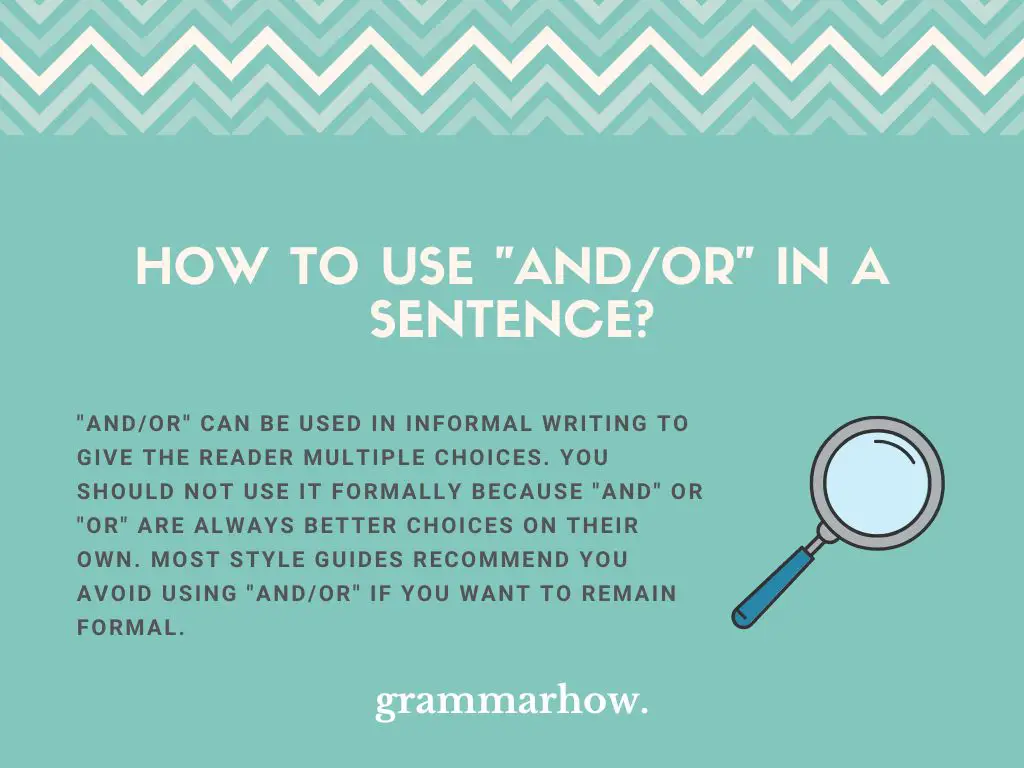“And/or” offers a choice for readers. “And” allows you to choose multiple options, “or” allows you to choose between different options. The implication is that you can choose one or many things. This article will explain how to use it correctly.
How to Use “and/or” in a Sentence?
“And/or” can be used in informal writing to give the reader multiple choices. You should not use it formally because “and” or “or” are always better choices on their own. Most style guides recommend you avoid using “and/or” if you want to remain formal.

The problem comes from using the slash between the words. It’s an informal construct because the slash removes the formal tone you are trying to convey.
It’s best to stick to “and” or “or:”
- We can do this and/or that.
- We can do this and that.
- We can do this or that.
“And” suggest you can do both options. “Or” suggests you can pick one. “And/or” gives you the option for one or both, which is slightly different to both “and” and “or.”
To fix this issue, you may use the following phrase:
- We can do this or that, or both.
Here, “or both” is used more formally to show that one or both options are available.
How Do You Punctuate “and/or” in a Sentence?
If you are going to use “and/or,” it would help to know how to punctuate it. The slash is commonly used, so it’s wise to stick with it.
You should never write “and or” as two words in the same part of the sentence. “And/or” must always be slashed to show that both options are available.
“And or” creates a problem in a sentence when no punctuation is used:
- We can go biking and or climbing.
Here, “and” and “or” are next to each other, making it less clear what you’re trying to suggest.
- We can go biking and/or climbing.
This time, the slash makes it clear that both options are available, but we can also do one if it’s better suited to us.
What Does “and/or” Mean?
“And/or” means that you can choose one or multiple options from a list. You do not have to limit yourself to one option, as “and/or” provides you with a way to choose from everything.
To clear this up, you can see it in action:
- We can play games or watch TV.
Here, “or” allows you to choose between “games” or “TV.” You can’t have both, but you can choose one.
- We can play games and watch TV.
Here, “and” allows you to pick both “games” and “TV.” Your choices do not limit you, but it’s encouraged that you pick both.
- We can play games and/or watch TV.
“And/or” gives you the most freedom. You can choose to do both options, or you can choose to only do one, depending on how you’re feeling.
Is “and/or” Grammatically Correct?
It’s already been made clear that “and/or” isn’t formal. However, does that mean it’s incorrect?
“And/or” is grammatically correct in most situations. The only problem is that it isn’t formal.
Many writers use “and/or” when they want to convey a choice to the reader. It’s common to see it in informal outlets when giving the reader free reign over what to choose.
Formality doesn’t always have to come into play when deciding whether something is grammatically correct.
Sometimes, conceptual choices from native speakers are all you need to look into. In this situation, native speakers choose to use “and/or;” therefore, it’s correct as an informal phrase.
When Is It Appropriate to Use “and/or”?
It’s difficult to decide when it’s appropriate to use “and/or.” Most official style guides suggest not to use it at all. Instead, they would recommend using “and” or “or” or “both.”
The best time to use “and/or” is when writing informally or making a list of choices for a friend. If you are writing to your friends, you do not have to worry about using something like “and/or” to help them come to any decision.
Final Thoughts
“And/or” is not a formal phrase, but it is grammatically correct. You should use it when creating lists that offer decisions for people you know. It’s best to avoid it in professional situations. If you need to use something similar, “and,” “or,” or “or both” are the best alternatives.

Martin holds a Master’s degree in Finance and International Business. He has six years of experience in professional communication with clients, executives, and colleagues. Furthermore, he has teaching experience from Aarhus University. Martin has been featured as an expert in communication and teaching on Forbes and Shopify. Read more about Martin here.

